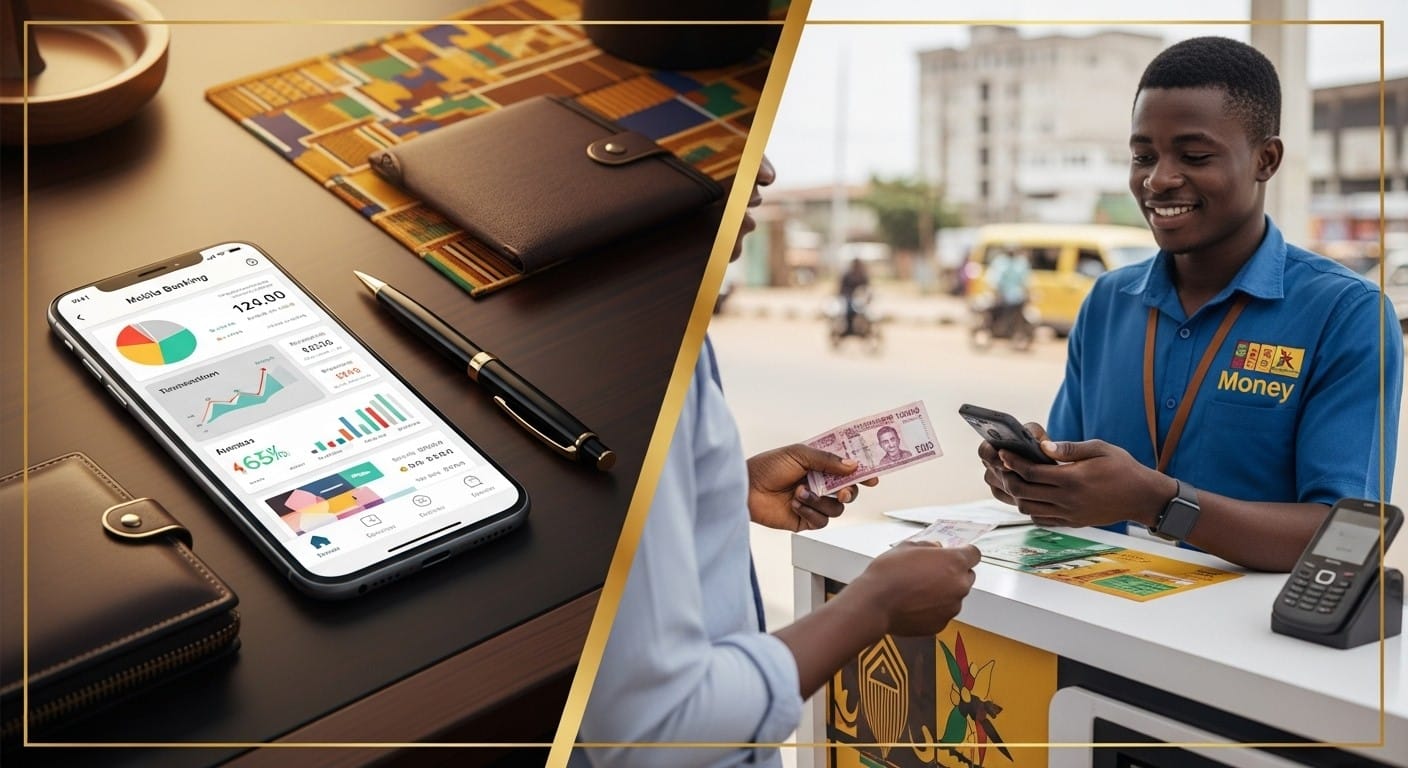Mobile Banking vs. Mobile Money: Decoding Ghana’s Digital Finance Future
Ghana‘s financial landscape is undergoing a dramatic transformation, moving rapidly from cash-based transactions to a digitally-driven economy. At the heart of this revolution are two powerful, yet distinct, forces: traditional mobile banking offered by established banks, and the widespread mobile money services pioneered by telecommunications companies (telcos). In this burgeoning ecosystem, a critical question emerges: when considering **mobile banking vs mobile money, which is truly driving the future of finance in Ghana?** This article delves into the data, regulatory shifts, and user experiences to provide a definitive answer.
What is Mobile Banking? The Bank-Led Approach
Mobile banking in Ghana represents the digitization of traditional banking services. Spearheaded by institutions like GCB Bank and Standard Chartered, mobile banking apps offer a comprehensive suite of financial tools directly on a user’s smartphone. This approach is designed to provide existing bank customers with convenience and 24/7 control over their finances.
Key Features of Mobile Banking:
- Full Account Management: Users can open accounts, check balances, view statements, and transfer funds.
- Advanced Financial Products: Access to services beyond simple payments, including investing in term deposits, applying for loans, and requesting debit or virtual cards.
- Bill Payments and Services: Conveniently pay utility bills (like ECG and Ghana Water), school fees, and other services for numerous billers.
- Enhanced Security: Features like fingerprint/Face ID logins, PINs, and transaction alerts provide robust security for banked assets.
The primary prerequisite for mobile banking is a formal bank account, which often comes with stricter Know-Your-Customer (KYC) requirements. While incredibly powerful for the banked population, user reviews sometimes highlight challenges with transaction failures and customer support, indicating that the digital extension of a traditional institution can sometimes carry over operational hurdles.
What is Mobile Money? The Telco-Driven Revolution
Mobile money, famously championed by MTN’s MoMo, represents a paradigm shift in financial access. It is a service linked to a mobile phone number, not necessarily a bank account, allowing users to store, send, and receive money electronically. Its meteoric rise is the single biggest factor behind Ghana’s surge in financial inclusion.
The Financial Inclusion Engine:
- Unprecedented Accessibility: The most significant advantage of mobile money is its reach. With less stringent KYC requirements (often just a national ID like a Voter’s or NHIS card), it has brought millions of unbanked and underbanked Ghanaians into the formal financial system.
- Vast Agent Network: A sprawling network of MoMo agents across the country, even in rural areas, allows for easy “cash-in” (depositing cash into a wallet) and “cash-out” (withdrawing cash). This physical infrastructure is something mobile banking lacks.
- Core Services for All: Beyond peer-to-peer transfers, mobile money facilitates bill payments, airtime top-ups, and merchant payments. Increasingly, it also offers access to micro-loans, savings, and insurance products through partnerships.
The success of mobile money was not accidental. It was supercharged by a crucial regulatory change in 2015 when the Bank of Ghana’s new E-Money Issuer Guidelines allowed telcos (MNOs) to own and operate their mobile money networks, freeing them from the previous, more restrictive bank-led model. This gave MNOs like MTN the confidence to invest heavily in agent networks and customer education, leading to explosive growth.
Mobile Banking vs. Mobile Money: A Head-to-Head Comparison
To understand their distinct roles, a direct comparison is essential. This table clarifies the fundamental differences between the two dominant forms of digital financial services in Ghana.
| Feature | Mobile Banking | Mobile Money |
|---|---|---|
| Primary Provider | Licensed Banks (e.g., GCB, StanChart) | Telecommunication Companies (e.g., MTN, Vodafone) |
| Prerequisite | Formal Bank Account | Mobile Phone Number & a basic ID |
| Target Audience | Primarily the banked population | The entire population, especially the unbanked and underbanked |
| Core Function | Convenient access to a full suite of banking services | Cashless payments, transfers, and basic financial services |
| Key Infrastructure | Digital app and internet connectivity | Digital app, USSD, and a physical agent network for cash-in/out |
| Primary Driver | Convenience for existing customers | Financial Inclusion for the masses |
The Decisive Factors Shaping Ghana’s Digital Future
While the two services cater to different initial needs, several market-wide factors are influencing their evolution and convergence.
Financial Inclusion and Interoperability
Mobile money is the undisputed champion of financial inclusion. By 2021, a staggering 39% of Ghanaian adults had a mobile money account, a figure that has only grown. The game-changer that bridged the gap between these two worlds was the launch of mobile money interoperability in 2018 by Ghana Interbank Payment and Settlement Systems (GhIPSS). This masterstroke enabled seamless fund transfers between mobile money wallets and bank accounts, effectively making mobile money an on-ramp to the broader financial system.
The Rise of Fintechs
A new wave of innovative Financial Technology (fintech) companies like Zeepay and ExpressPay are building services that leverage both platforms. They utilize the massive reach and accessibility of mobile money for customer acquisition and transactions, while also integrating with banking infrastructure for more complex operations. This synergy demonstrates that the future is not a zero-sum game.
Headwinds: The E-Levy and Security Concerns
The path forward is not without challenges. The introduction of the Electronic Transactions Levy (e-levy) raised significant concerns, with many fearing it would disincentivize digital payments and push people back towards cash, potentially reversing years of progress in financial inclusion. Furthermore, as digital transactions grow, so do security risks. Mobile money fraud, through social engineering and scams, remains a persistent issue that erodes user trust and requires constant vigilance and education from providers and regulators.
The Verdict: A Converged Future, Built on Mobile Money’s Foundation
So, which is driving the future? The evidence overwhelmingly shows that mobile money is the primary engine of Ghana’s digital finance revolution. It has solved the fundamental challenge of access, bringing millions of people from the economic periphery into the formal system. It is the foundation upon which the future is being built.
However, mobile banking plays a crucial, complementary role. It provides the depth of service—complex investments, substantial loans, and comprehensive financial management—that represents the next step in a user’s financial journey. The discussion of **mobile banking versus mobile money in Ghana** is therefore not about a battle with one winner. The true future is a converged, interoperable ecosystem. Mobile money is the gateway, creating a vast new customer base that, as its financial needs mature, can seamlessly access the sophisticated services offered by mobile banking and the wider fintech industry. Mobile money built the highway, and now everyone is starting to drive on it.





